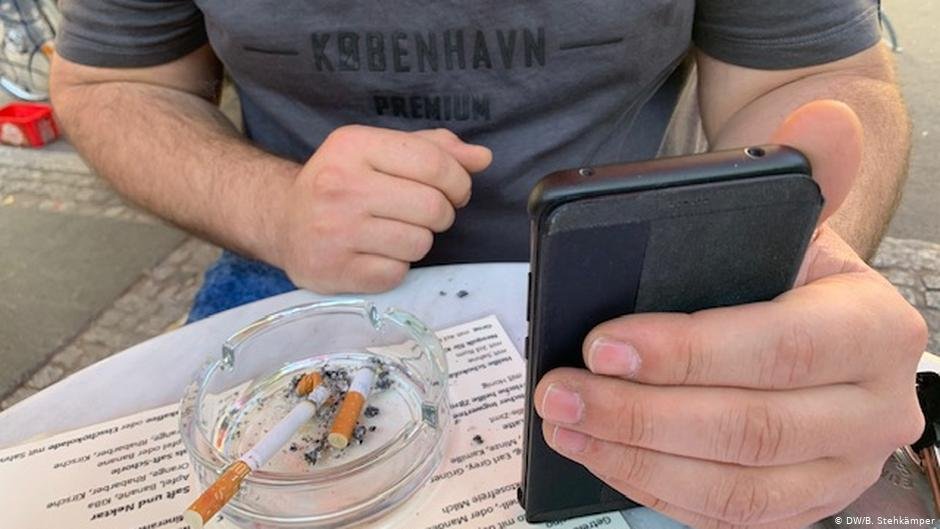Ten suspected members of a transnational sex-trafficking network are on trial for allegedly luring Thai women and transgender people to Germany on false promises of work. Prosecutors say the group arranged for victims to enter Germany on tourist visas, confiscated their passports, and forced them into sex work to pay off supposed "debts".
Court proceedings for ten members suspected of being part of a transnational sex-trafficking network and accused of human trafficking, forced prostitution, and money laundering began yesterday (November 11) at the Bielefeld Regional Court in western Germany, newspaper Die Welt reported.
The defendants are on trial for luring Thai women and transgender people to Germany on false promises of work using tourist visas. Once they were in Germany, their passports were reportedly confiscated, and they were forced into sex work to pay off their debts that ranged from betweem 18,000 to 36,000 euros, the supposed price of their flights and travel arrangements.
The multi-national gang is reportedly between 29 and 64 years old and includes citizens of Great Britain, Germany, Thailand, and Sweden. The suspects are thought to be from the German state of North Rhine-Westphalia, including Löhne, Bad Oeynhausen, Minden, and Bünde, as well as Hamburg, Rostock, and Frankfurt.
According to the investigation, in early 2018, a 57-year-old defendant from Löhne in East Westphalia began to bring women and transgender people from Thailand and forced them into sex work in Germany. Over the years, a network of various Thai brothels developed in Germany.
The suspects were said to have taken on various roles within the smuggling network. Some organized the recruitment system, others acted as drivers or couriers, while others ran the brothels, which had rotational operations in North Rhine-Westphalia, Hamburg, Lüneburg, and Weimar.
Prosecutors claim that as the women’s earnings declined, the traffickers rotated them between brothels in multiple states, following what investigators describe as a "rotation principle" common in the sex industry. Some defendants are believed to have involved family members, including daughters and partners, in the enterprise. The court proceedings are scheduled to run until late April 2026.
Lured from Thailand, trapped in debt in Germany
According to investigators, the Thai women and transgender people were promised legitimate jobs in Germany. Upon arrival, their passports were confiscated, leaving them undocumented and fully dependent on the traffickers. Most spoke little or no German and had no local contacts. According to prosecutors, the victims had no control over their movements and were compelled to pay a weekly rent of 500–600 euros.

Citing Germany’s Federal Criminal Police Office (BKA), newspaper Die Welt described the case as part of a wider pattern in which Asian nationals are recruited by agencies in their home countries and smuggled to Europe by compatriots.
The agency’s latest Federal Situation Report on Human Trafficking (2024) documented 16 Thai victims of sexual exploitation, though officials believe the real number is far higher due to victims’ fear of both traffickers and authorities, as well as insecure immigration status. Debt bondage and emotional coercion remain central to many trafficking cases.
Read Also50 million people trapped in 'modern slavery' — report
Gaps persist in combating trafficking
Germany retained its Tier 1 ranking in the U.S. State Department’s latest Trafficking in Persons (TIP) Report. According to the State Department’s ranking, the highest Tier 1 country classification does not mean that trafficking has been fully eradicated. Rather, it means the government is making serious and sustained efforts to prevent trafficking, protect victims, and prosecute offenders.
The government initiatives cited for the Tier 1 ranking included Germany’s adoption of its first National Action Plan (NAP) to prevent and combat trafficking, greater funding for NGOs that assist victims, and the publication of the country’s first comprehensive trafficking report with systematic data analysis.
However, the TIP Report also highlighted persistent gaps. Authorities prosecuted and convicted fewer traffickers than in previous years, and courts continued to issue lenient sentences. Victim identification declined, and some victims were penalized for crimes committed under coercion.
Details in the TIP Report reveal that traffickers in Germany increasingly exploit victims in private apartments and hotels rather than in brothels or other public venues, making detection more difficult. Authorities identified 596 trafficking victims in 2023, including 406 exploited in sex trafficking and 190 in labor trafficking. Women from Eastern Europe and Southeast Asia remain particularly vulnerable, while LGBTQ+ migrants also face heightened risks of sexual exploitation.
Targeting women
The TIP Report cited that of the 596 trafficking victims identified in 2023, 406 were in sex trafficking and 190 in labor trafficking. The actual number is likely to be higher due to gaps in national data collection and the absence of a unified victim identification and referral system.
The report also pointed out how traffickers are using increasingly sophisticated recruitment tactics that can include a mix of technology and seduction. Many victims, particularly women and girls from Romania, Bulgaria, China, Vietnam, and Thailand, are reportedly lured through false job offers in the service or modeling industries. Others are deceived online through social media and messaging apps, video portals, chat rooms of gaming sites, and dating apps, where traffickers pose as romantic partners using a seduction cum recruitment method.

According to a report from the Bundesweiter Koordinierungskreis gegen Menschenhandel e.V. (KOK), a national umbrella network of NGOs in Germany working on trafficking and exploitation, in 2024, 868 cases of trafficking in human beings were documented. This represented a 23 percent increase over the previous year. Of this number, 659 cases were analyzed, revealing 84 percent of those affected were women. Sexual exploitation remained the most common form of exploitation, followed by labor exploitation.
Read AlsoUNODC report: Trafficking on the rise, forced labor overtaking sexual exploitation
The 'Loverboy / Romeo' method
According to the non-profit organization Bayern Gegen Gewalt (Bavaria Against Violence), the "Romeo" or "lover boy" method is a form of human trafficking in which a young man pretends to be in love with a woman or girl to gain her trust and emotional dependence.
By chatting with the potential victim or by using information available on an online profile, the trafficker collects details about the potential victim to tailor their seduction tactics to the needs and aspirations of their target.

As a suitor, a "Romeo Loverboy" is typically lavish with compliments, gifts, and affection. Once the potential victim becomes emotionally attached and isolated from family or friends, "Romeo Loverboy" takes on the behavior of a trafficker, pressuring or coercing his feigned object of affection into sex work, often in private apartments or hotels rather than public brothels, claiming that the money is necessary for them to build a future together.
In reality, according to Gewalt Los Werden, the victim becomes trapped in a cycle of exploitation that is tainted with emotional turmoil.
The emotional manipulation used in the "lover boy" method poses a growing challenge for German law enforcement and social workers, who say victims often mistake their traffickers for partners rather than perpetrators.
Citing the government Report on Human Trafficking and Exploitation, Gewalt Los Werden said that in 2021, 291 cases of sexual exploitation were concluded in Germany. These cases involved 417 victims, where an estimated 85 victims were forced into sex work using the so-called "loverboy" method.
Read AlsoOnline trafficking networks target women and juvenile migrants
If you suspect human trafficking or need assistance, helplines and support are available here.
